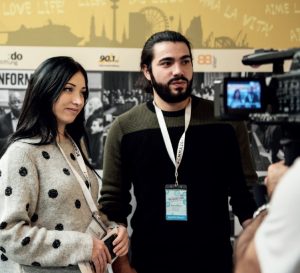Spa ces of Inclusion – An explorative study on needs of refugees and migrants in the
ces of Inclusion – An explorative study on needs of refugees and migrants in the
domain of media communication and on responses by community media
Due to conflicts and crises in the Middle East, most prominently the ongoing war in Syria, an increasing number of European countries has been faced with the arrival of bigger numbers of refugees and migrants since 2015. Whereas the media coverage of the ‘refugee crisis’ and the ways in which refugees are portrayed have been in the focus of a range of academic studies and public debates, media practices, communication needs and possibilities of participation and self-representation of recently arrived migrants and refugees have been rather neglected.
Addressing precisely these questions, this explorative study has been commissioned by the commissioned by the Information Society Department of Council of Europe Directorate General of Human Rights and Rule of Law and produced by COMMIT, the Community Media Institute based in Austria. It aims at providing an overview of key issues that will deliver first indications on how to develop adequate responses. In focusing on the role and the potential of local initiatives and more specifically of community media, the study is less concerned with private or interpersonal communication via mobile devices than with the possibility for migrants and refugees to access spaces of wider communication in order to exercise their right to freedom of expression, including the right
to information.
Download report here (pdf): http://media-diversity.org/en/additional-files/DGI201801_Spaces_of_Inclusion.pdf.pdf
Based on their findings, the authors propose the following list of actions to improve migrants’
and refugees’ access to media as spaces of public communication and in order to facilitate
their exercise of their right to freedom of expression:
Policy-makers should:
- recognise the contribution of locally based and community-owned media to dialogue,
inclusion and a more socially representative media landscape; - include and consult with community media when developing intercultural integration
or inclusion policies at the national, regional and local level; - develop adequate policies to implement at national level the European Parliament
(2008) Resolution on Community Media in Europe and the Council of Europe (2009)
Declaration of the Committee of Ministers on the Role of Community Media in
Promoting Social Cohesion and Intercultural Dialogue, in particular by
o Giving legal recognition to community media as third media sector, alongside
public and commercial media;
o Committing funds at national, regional and local level to support the sector;
o Encouraging studies on good practices, outreach and quality development in
local and community media and the exchange of good practices;
o Facilitating capacity building and training of local and community media staff
with an inclusive approach;
encourage and support further research on refugees’ and migrants’ needs regarding
their orientation, participation and social inclusion in local society and structures
Civil society organisations should:
- develop media partnerships with local and community media to raise awareness and
visibility of concerns and issues of under-represented communities; - support (critical) media literacy of organisations’ members through participation in
community media trainings and programs; - 3ncourage public service and commercial media to improve representation of social
groups that are under-served, marginalised, neglected, or misrepresented.
Public service and commercial media should:
- recognise refugees and migrants as relevant and respected parts of the audience
with specific interests and needs (such as concerning information about rights,
services, resources and duties); - develop media partnerships with community media aimed at multiplying visibility of
content produced locally by people with a refugee or migrant background; - support exchanges of training and contacts with community media;
- encourage the development and implementation of inclusion policies for personnel
structure and content production.
Community media should:
- identify and tackle any barriers to access and participation for people with a refugee
or migrant background to the stations’ programming and management; - strengthen partnerships and exchanges of good practice within the community
media sector, in particular related to training formats for multilingual and
intercultural programming; - multiply visibility and access to media content and training through partnerships with
civil society organisations, local institutions, public service and commercial media.
